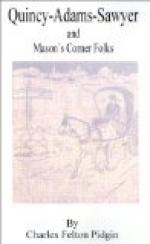“I hope not,” said the Deacon, “I kinder promised some one that I’d be on hand about noon to-day with five hundred dollars that he wants to use on a business matter this afternoon.”
Quincy took the Deacon by the arm and pulled him one side, out of hearing of any other person in the room.
“Say, Deacon Mason, I am going to ask you a question, which, of course, you can answer or not, as you see fit; but if this business matter turns out to be what I think it is, I may be able to save you considerable trouble.”
“I don’t think you would ask me any question that I ought not to answer,” replied the Deacon, glancing up at Quincy with a sly look in his eye and a slight smile on his face.
“Well,” continued Quincy, “are you going to let Strout have that money to pay down on account of the grocery store?”
“Why, yes,” said the Deacon, “I guess you have hit it about right. Strout seemed to think that there warn’t any doubt but what he could get the store, but as he said the town clerk was willing to endorse his note, I came over here last night just on purpose to find that out. I kinder thought I was perfectly safe in letting him have the money.”
“Oh, you would be all right, Deacon, financially, if the town clerk or any other good man endorsed his note; but you see Strout won’t need the money. I happen to know of another man that is going to bid on that grocery store. How much money do you think Strout can command; how high will he bid?”
“Well, he told me,” the Deacon answered, “that he had parties that would back him up to the extent of two thousand dollars, and this five hundred dollars that I was goin’ to lend him would make twenty-five hundred, and he had sort o’ figured that the whole place, including the land and buildings and stock, warn’t wuth any more than that, and that Benoni Hill would be mighty glad to get such a good offer.”
“That’s all right,” said Quincy, “but I happen to know a man that’s going to bid on that grocery store and he will have it if he has to bid as high as five thousand dollars, and he is ready to put down the solid cash for it without any notes.”
The Deacon glanced up at Quincy, and the sly look in his eye was more pronounced than ever, while the smile on his face very much resembled a grin.
“I guess it must be some outside feller that is a-going to buy it then,” said the Deacon, “for I don’t believe there is a man in Eastborough that would put up five thousand dollars in cold cash for that grocery store, unless he considered that he was paying for something besides groceries when he bought it.”
“Well, I don’t think, Deacon,” continued Quincy, “that we need go further into particulars; I think we understand each other; all is, you come up to the auction this afternoon, and if the place is knocked down to Strout I will let you have the five hundred dollars that I have here in my pocket; besides, it would have been poor business policy for you to let him have the money on that note before the sale; for if the store was not sold to him you could not get back your money until the note became due.”




